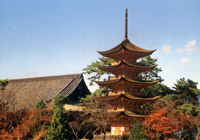Japan's Revised Religious Corporations Law excerpt
"Historically, religious freedom in Japan has been a delicate affair. The violent suppression of the Jodo Shin Sect in the 15th and 16th centuries and the persecution of Christians in the 17th century are examples of repression where religion was perceived as a threat to the existing order, or when it was seen as functioning as an independent center of moral authority. |
 Japanese Meditation Hall and Pagoda
Japanese Meditation Hall and Pagoda |
The struggle to guarantee the principle of church-state separation and the corresponding religious neutrality of government, thereby allowing for religious freedom, can be dated back to the Meiji Era. While the 1889 Meiji Constitution contained a provision guaranteeing religious freedom, it contradictorily emphasized the centrality and sanctity of the Emperor, reinforced by the divinity accorded him by Shinto, which enjoyed state support. In 1925, the Peace Preservation Law (revised in 1941) stifled freedom of speech and conscience. The 1940 Religious Organizations Act united all religious activities under the leadership of State Shinto, which in effect provided the basis for suppression of all opposition enabling ultra-nationalists to wage war. Article 20 of Japan's post-war constitution sought to remedy this situation by providing that "Freedom of religion is guaranteed to all; no religious organization shall receive any privileges from the State nor exercise any Public Authority." The 1951 Religious Corporation Law was enacted to give legislative effect to the spirit of Article 20, granting broad freedom from official scrutiny and taxation to thousands of officially recognized religious groups."
|
